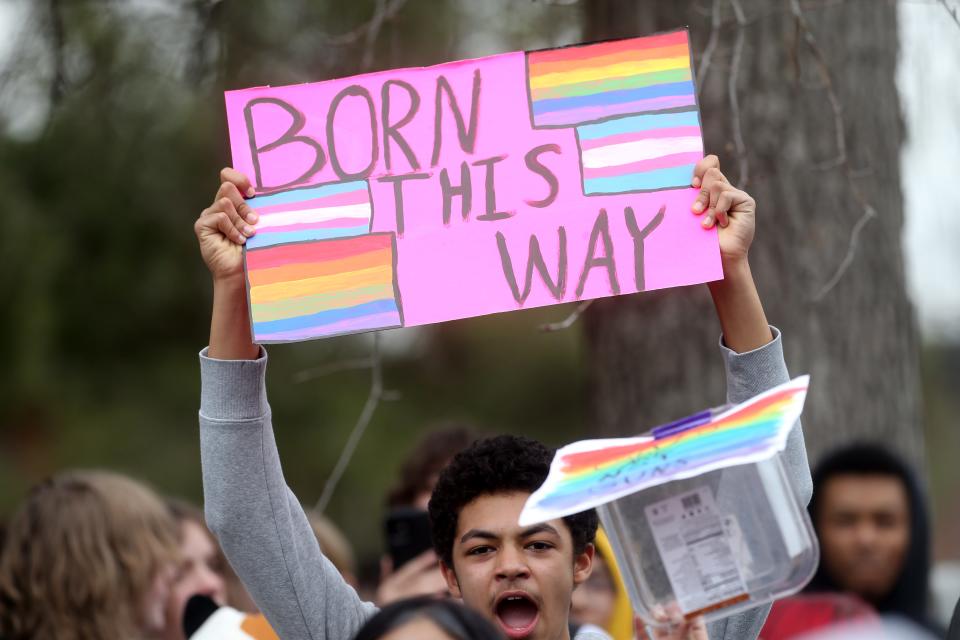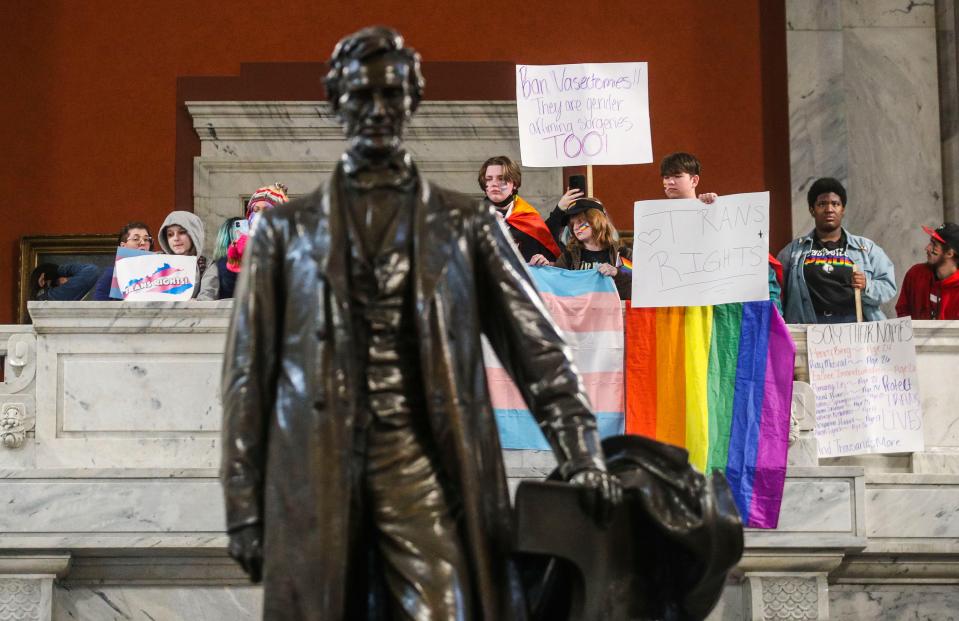Sexuality isn't a justification for murder. Kentucky's 'gay panic' defense says it is.
If you’re charged with murdering someone who is queer or trans in Kentucky, you may have a powerful legal defense on your side. Kentucky is among the states that allow for you to excuse that murder on the basis that your violence was a justified reaction to the victim’s sexual orientation or gender identity.
That might sound outrageous, because it is. It's also true.
It's called the LGBTQ+ “panic” defense, and it is nothing new in America’s legal system. Thankfully, it is on a rapid decline.
In the past decade, 17 states and Washington, D.C., have expressly banned the use of the gay/trans panic defense. This year alone, both New Hampshire and Delaware joined in outlawing the defense.

Why hasn't Kentucky outlawed panic defense to murder charges?
The LGBTQ+ panic defense relies on the assumption that it is reasonable for a perpetrator to react violently to discovering a victim’s sexual orientation or gender identity, or in responding to a romantic advance by a queer or trans person.
The defense has allowed for individuals accused of murder to have their charges and sentences reduced because of their “justification” for responding violently to the knowledge that an individual identifies as LGBTQ+.
The gay/trans panic defense is not a passive and never-before-used legal tactic. Since the 1960s, it has been frequently used in court opinions in roughly half of the states.
The panic defense has been used in Kentucky to excuse the murders of queer people. Twenty years ago, Joshua Cottrell lured Guin “Richie” Phillips, a 36-year-old gay man, into an Elizabethtown hotel room and killed him. Phillips' body was found days later in a suitcase dumped into Rough River Lake.
Kentucky allows sexual identity as justification for murder
After Cottrell’s lawyers invoked the gay panic defense at trial, arguing that he was justified in responding violently to Phillips’ alleged romantic advance at the hotel, the jury rejected the murder charge and instead found Cottrell guilty of a lesser charge: second-degree manslaughter.
Cottrell was sentenced to 20 years for his killing of Phillips, but was eligible for parole merely 2 1/2 years after his conviction.
Beyond the devastating influence of the gay panic defense in excusing the murders of queer and trans civilians, the defense sends a clear message that an individual’s sexual orientation or gender identity is a valid basis to justify violence.
We misremember marriage equality fight. It wasn't 'easy,' but it paved the way for trans rights.
By continuing to allow for the gay/trans panic defense to be a valid legal excuse under Kentucky law, the legislature sends a message to our LGBTQ+ community that our identities are worthy of rejection, cruelty and violence.

Anti-LGBTQ+ agenda of Kentucky's conservatives is expanding
But for those witnessing the ever-expanding anti-LGBTQ+ agenda of Kentucky’s conservative lawmakers, it is no surprise that nothing has been done to address the panic defense.
Kentucky’s lawmakers proudly overrode Gov. Andy Beshear’s veto of Senate Bill 150 and allowed the bill to become law. It bans all gender-affirming medical care for trans youth and permits teachers to openly misgender and discriminate against students.
Starbucks gave trans employees lifeline. Then they put our health care at risk.
Against this backdrop, it is no wonder that so many within Kentucky’s LGBTQ+ community remain pessimistic about the prospect of prohibiting the use of this panic defense.
It is nonetheless crucial that we continue to call out Kentucky's lawmakers for their inaction on banning a malicious legal tactic that excuses violence against queer and trans people in the state.
And hope could be found in the reelection of Gov. Beshear, who has been a noteworthy champion for LGBTQ+ Kentuckians in his advocacy to ban conversion therapy and vetoing legislation that attacks members of our community.
With his final term approaching, Beshear has the unique opportunity to build on his pro-equality legacy and call on Kentucky’s legislature to join the growing number of states in rejecting the LGBTQ+ panic defense, an issue that has avoided the political spotlight.
Opinion alerts: Get columns from your favorite columnists + expert analysis on top issues, delivered straight to your device through the USA TODAY app. Don't have the app? Download it for free from your app store.
Although the prospects of banning the defense with a conservative supermajority in Kentucky’s legislature remains disturbingly slim, we owe it to past, present and future victims of sexuality- and gender-motivated crimes to call for an end to a defense that skirts justice where it is needed most.
Until then, as more and more states rid themselves of the gay/trans panic defense, Kentucky will unfortunately remain at the tail end of progress for LGBTQ+ equality.

Robert Blake Watson is a native of Louisville, Kentucky, and a graduate of the University of Pennsylvania Law School. This column first published in the Louisville Courier-Journal.
You can read diverse opinions from our Board of Contributors and other writers on the Opinion front page, on Twitter @usatodayopinion and in our daily Opinion newsletter.
This article originally appeared on Louisville Courier Journal: Can you kill someone for being gay? 'Panic' defense is homophobic.

